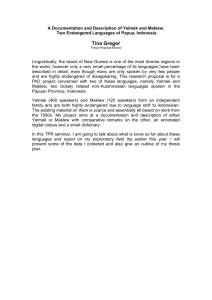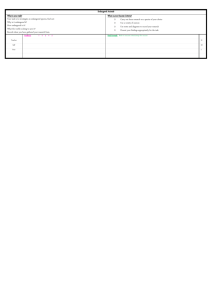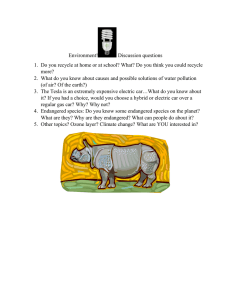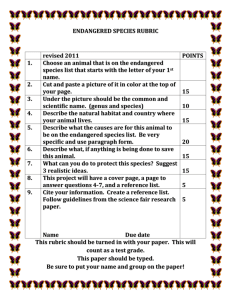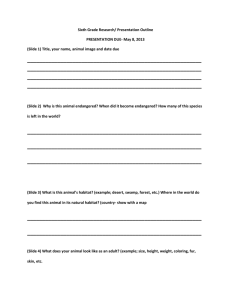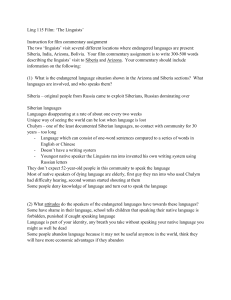Seminar on Endangered Languages
advertisement
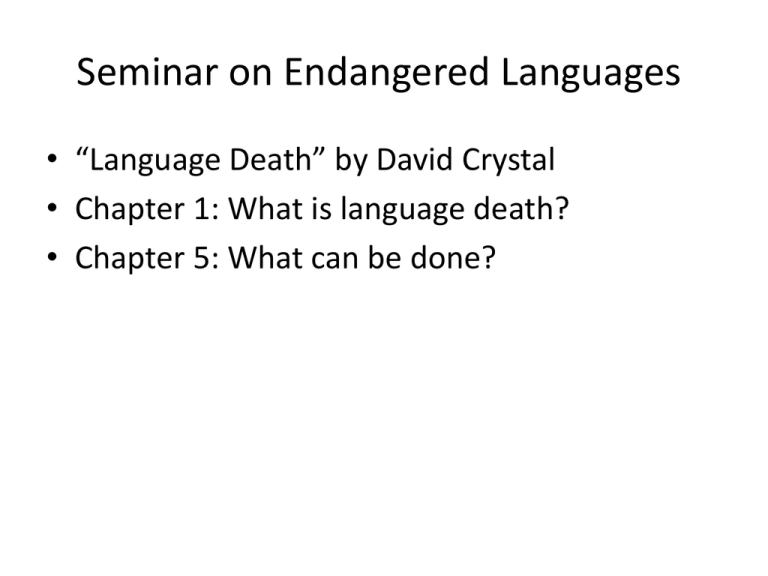
Seminar on Endangered Languages • “Language Death” by David Crystal • Chapter 1: What is language death? • Chapter 5: What can be done? Language Death • Number of languages – How to count • Names of Languages – Own name, others names • Tapshin/Nsur, Ns’r, Suru, Dishili, Myet... • German, allemand, deutsch, tedesco • Language vs. Dialect – Mutually intelligible – But exceptions: Swedish, Danish, Norwegian; Cockney, AAV – Socicopolitical movement can “upgrade” languages • Half the current languages will die (?) How Many Speakers to Survive • Is 500 enough? – Depends on community size – Depends on community dispersal – Depends on community age distribution • How many is enough? – Top 20 languages spoken by 50% of people • Dutch could become a language for home use only; not for business, education, and science Pathways to language death • • • • • Decline of use at home Aging of fluent population Migration (in and out) Dispersal Integration with dominant language community • Domain shift (education, business, religion...) • Policy Patterns of loss • Simplification of grammatical structures • Transfer of dominant language structures • Vocabulary – Some languages survive in one domain only (e.g. Botany) • What else? Significant loss can occur over one generation Prestige An endangered language will progress if its speakers increase their prestige within the dominant community • Media presence • Business • Law • Public administration • Grass-roots dynamism Languages are not “objects” to be saved, but processes of social interaction that define a group Wealth • An endangered language will progress if its speakers increase their wealth relative to the dominant community • Strengthened economy of a region (Catalonia) – Service industries, e.g. Tourism – NOT primary industry (invites exploitation) Legitimate power An endangered language will progress if its speakers increase their legitimate power in the eyes of the dominant community Signatory nations of the European Charter for Regional or Minority Languages Education An endangered language will progress if its speakers have a strong presence in the educational system • School can reinforce or marginalize mother tongue • Strong youth identity leads to strong social structures • Teacher proficiency / training • Extra-curricular activity is a key component • “Education” includes adult, community Literacy • An endangered language will progress if its speakers can write their language down • Written language is static; oral language changes over time (good or bad?) • Not just a repository – an analysis, system • Controversial – writing can represent a loss of ownership • Which variety? The digital world • An endangered language will progress if its speakers can make use of electronic technology • Contributes to a public profile (equitably?) • The internet separates identity from geography • Normalization tools (text mining, spell check) • Localization So what can linguists do? • • • • • Diagnosis and assessment Description and analysis Intervention and re-assessment Linguist as doctor of linguistic health – DNH Linguist’s role in helping communities value and identify threats to their language • Importance of social and political skills • Documentation – Only 60% of languages have any corpus • Preventative linguistics Linguists and communities • The community, and only the community, can preserve a living language • Team approach to management – Makes use of diverse skills / contributions – Can be tricky to negotiate different agendas • • • • Ultimately, local people must be trained Ownership vs. Stewardship Outsiders (academics!) profiting Rights to data Friday?
